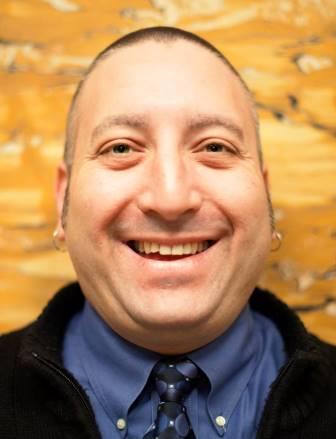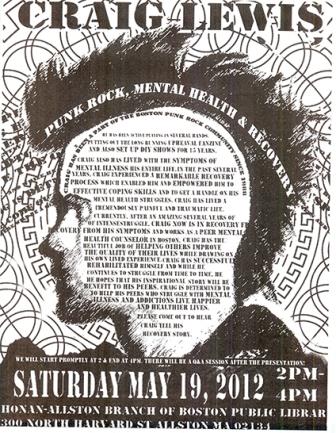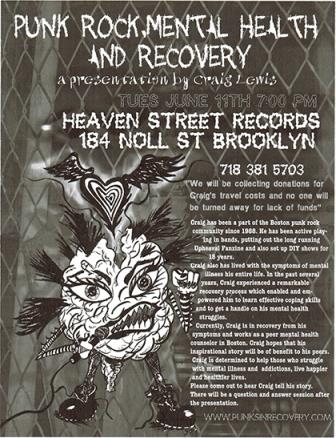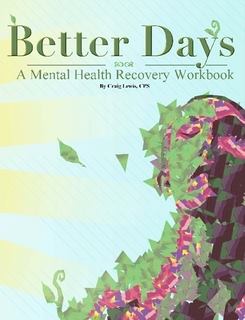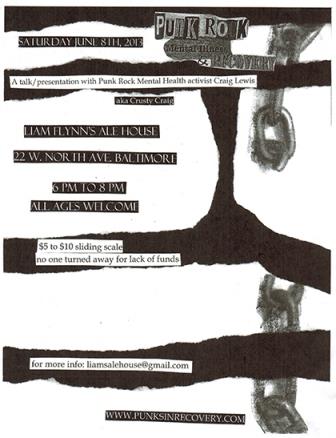
| |||||
|
Craig Lewis came to Baltimore this past June. Unfortunately, I wasn't able to hear him
speak. When he Facebook messaged everyone who had RSVP'd to the event to talk about his
new book, I jumped at the chance to interview him. People in the punk scene need to be
open about trauma. My own recovery process has delayed the publication of this interview,
but it's so worthwhile to finally see this baby online. I hope you all enjoy the read.
|
Punk Globe: Hey Craig, thanks for doing this interview. Please tell us a bit about
yourself and your book, Better Days.
Craig Lewis: My name is Craig Lewis, I'm forty years old. I live in Boston,
Massachusetts. I am a person with lived experience with mental health conditions. I spent
the vast majority of my life mentally unhealthy, living a very dysfunctional and
dissatisfying life. I spent many years receiving subpar services in the mental health system.
My family did not do a very good job in supporting me and helping me get well.
Ultimately, after hitting rock bottom in front of many, many people who I knew in the
punk rock community in 2004 and really outing myself as an unstable person in ways that
went beyond the general consensus of how unhealthy I was, I tried to figure out if I
wanted to live or die. I asked myself, "Do I want to pick up and try again or do I just
not want to be alive." I took a step and moved to a different part of Boston, where I
found a wonderful therapist in Boston. I met with her religiously every week for many
years. I found a psychiatrist who would work with me to get my medications figured out
and get me treated for the problems I had and not the ones that I didn't have. I went
through this process called recovery, which is a long journey filled with lots of ups and
downs. I learned coping skills and new ways to manage my relationships and interactions.
Over the course of time, I went to school and did an internship. As part of that
internship, I was required to leave something behind at the program I was interning at. I
decided that I would start up a psycho-educational support group. I have personal, lived
experience. I'm open and out about it, it's not a secret. With a curriculum that I'd
prepared, I would lead a group of 5 to 10 people who all identified as having a mental
health issue of some sort. I finished my internship and had a volunteer position for two
years in a recovery community in Boston. I led the group every Thursday for about two
years. The whole time, I'd been generating curriculum with the intention of benefiting
the people I was working with. It wasn't until years after that I realized I had this
body of work could be transformed into a book that people could potentially want to buy.
I spent the last year editing it with the help of an editor and working on the cover with
a local artist. It's out now and it seems like people are excited about it. I'm also
having a great time with it and I'm excited as well!
Punk Globe: What made you want to start taking the workshops on the road?
Craig Lewis: I had an opportunity in January of 2012 where, quite interestingly, there
were these vegan potlucks going on at a community space in Boston and they had a speaker
named Chris Pittman, a guy who I've known for a long time, who is an expert on aliens.
He's been on The History Channel and he gave a presentation to the people at the potluck
about aliens. I heard about it and went to one of the potlucks. I went to the people who
were hosting the potluck and asked if I could do a talk about punk rock, mental illness,
and recovery. They said yes and five days later, I gave a presentation. My first time
doing it was sloppy, but since then, I've been to New York, DC, Baltimore, Pittsburgh,
and Canada. I'm having a great time going and meeting people because there are so many
people in the punk rock community who struggle with their mental health, trauma, and
addictions who aren't getting really helpful support. Our community supports dysfunction
and nurtures drinking to solve our problems. That didn't work for me and it doesn't work
for a lot of people. I thought it was really important to tell my story, so that's what I
do and I plan to continue touring, traveling, and telling my story, hopefully all over
the world, and spreading a message of hope that people can and do get control of some of
these issues and live lives filled with meaning and purpose and be happy, healthy, and
well.
Craig Lewis: When I was in Toronto, my friend and mentor was with me. I met somebody as a
result of the talks being advertised online. He was a recent immigrant to Toronto and we
chatted back and forth, he helped flier the event. At the event, I spoke for fifty
minutes and there was a long line of people waiting to talk to me. He came up to me with
his girlfriend and said, "We'd like to talk to you afterwards." After we were all packed
up, my friend and I went outside to meet this person and his girlfriend. We went to a
restaurant and ended up talking for about two and a half hours about dealing with trauma
and the probability of getting well. We talked to them about substance abuse, coping
skills, how to get their needs met, and how to manage the issues that we have in order to
live a healthy life. That conversation was one of the most meaningful conversations that
I've had in my entire life. I treasure it to this day and I'm grateful not only that I
was able to go to Canada and speak, but also that I was able to meet a couple of
wonderful people who were desperate for someone to understand, support, and be honest
with them. That's exactly what my travel partner and I were able to do. It was a
wonderful experience and it felt incredible, even as we drove twelve straight hours home.
Punk Globe: What do you think punks can do to support each other that doesn't involve
alcohol or drugs?
Craig Lewis: We can become informed. If you have a friend who's struggling, you can
encourage them to get help. Help can come in whatever form is right for that person.
Maybe it's getting on medication, maybe it's going to a support group, or seeing a
therapist. As a friend of somebody in the punk scene who's going through to these
difficult times, we can become as informed as possible. We can help them figure out what
their options are. You can go to this place, you can try this person, this is a place
where you can get acupuncture, this is a place where you can get peer support. Be
supportive and not judgmental. We can refrain from putting our morals and values on that
person's need for help and desire to get well. In other words, whatever we think about
the mental health system, or this treatment, or this method of getting your needs met,
let's just help the person be as informed as possible about the decisions they make. A
lot of people say that the pharmaceutical industry is making money off of people with
mental illnesses. That is true, however, sometimes those medications do help some people
and we need to make sure that when we're supporting our friends in the punk scene who are
going through difficult times, that we empower them to make decisions based on what their
needs are instead of imposing our views on them. What might work for us and what we
believe to be true might be different for them. If we care about our friends, we'll
encourage them to make the best decisions for them
Punk Globe: Early on in the punk scene when mental health wasn't really thought of or
talked about widely, was there anything that could have saved people like GG Allin and
Darby Crash?
Craig Lewis: It's a societal issue. In the 70's and 80's, and even into the 90's, these
issues weren't talked about much. Throughout the history of the punk scene, there's been
a lot of emphasis on this attitude of "no future, just get fucked up, party, live a
reckless, careless life," and that's been a nurtured behavior for a very long time.
Countless amounts of people have fallen victim to that. In my opinion, there's a place
for being wild and having all sorts of fun and causing all sorts of chaos. I'm not saying
that shouldn't happen from time to time, I'm saying that, to answer your question, is
there something that could've helped these people? Maybe. Support, understanding,
compassion, empathy, could have all helped, but some of these people may have had lives
that were so painful, they may have come from homes that were so traumatizing, parents
that didn't get it or support them. In that day and time, the mental health system was
not about recovery, it was about containment. If somebody had difficulties and they were
forced to see a psychiatrist, they might lock them up or put them on medications that
weren't nearly as effective as they are now. For some people, that reaction of "No
future, no hope," is a reasonable response to an unreasonable world. Some of those people
may have benefited from peer support and information about recovery and some of them may
not have. In 2013, there are still people who get beaten down in the same ways, who might
be able to access and be benefited by recovery and wellness. Mental health is now a more
common topic in the media, but there going to be people who aren't going to be able to
get on board. Ultimately, those people could end up either in jail or dead. That's the
unfortunate reality. I'm hoping that more people will be able to get the help that they
need on their own terms.
Punk Globe: Historically, there's been a pathologizing of radical politics that uses the
mental health system to suppress people who advocate for social change. In the ‘60s and
‘70s, there were a lot of young black kids in the U.S. misdiagnosed with schizophrenia
for expressing anti-racist ideas. There are people who might read up on that history and
be leery of mental health treatment, so what would you say to them?
Craig Lewis: You're absolutely right that mental health treatment, especially years ago,
was used to silence people who were politically active, or dissidents, or speaking out
against the status quo. That was a common practice as far I know for people who spoke out
against the government in many countries including the United States. When I was 14 years
old in 1988, I was put in a mental hospital and diagnosed with schizophrenia. I was put
on medication for years and I never had schizophrenia. After that, I was put on
medication for bipolar disorder for twenty years and I never had bipolar disorder. So, I
was put on medications in an attempt to help me, but what it really did was make me sick.
I come from a personal, lived experience of being victimized by that reality. For me, I'm
now getting the effective assistance that I need to be well. That includes going to a
therapist and taking some medication, mostly to manage the degree of trauma that I've
developed after a lifetime of being improperly medicated and all the things that have
happened as a result. Through getting engaged and getting help, I've learned about
acupuncture, meditation, and how crucial exercise is to being well. What you're saying
happens, it happened to me, but I've been able to reconcile with it and find a way to be
well. My way of doing that is to take that information and share it with others so they
can also find a way that things can get better.
Punk Globe: You mentioned meditation and there's a Buddhist author named Brad Warner who
plays bass in the Cleveland punk band Zero Defex. Are you aware of his books? What do you
think of them?
Craig Lewis: I didn't know who he was and I just looked him up right now, so it looks
awesome. It looks like he's really trying to make a difference, sharing from his lived
experience and doing his part to benefit society. I've got to look into him more, but
thanks to you, I've heard of him. I'm really grateful for this information. Thank you!
Punk Globe: My therapist, who's helping me work through a lot of my trauma, was the bass
player in Apocalypse Theater for a while. So, what would you say to people in the punk
scene who want to become mental health professionals?
Craig Lewis: Well, I'm not a mental health professional. I'm an experiential health
professional; I work from my lived experience of having a mental health condition,
trauma, and substance use. I have been in what we call recovery since the late 2000's.
Recovery is a journey that has lots of ups and downs where we learn how to manage our
lives and what we face on a daily basis so that we can have relative peace while
realizing that we have tough days and better days. As a person from the punk scene who was
very openly mentally ill who said and did a lot of messed up things and hurt people and
damaged my own life as a result, I never thought that I could get well or that the punk
scene would support me in that. While I have to go through a very difficult process of
changing the conversation about Craig Lewis, who he is, and what he's doing, I've had
quite a bit of success in re framing how people view me, my name, and my reputation as a
person who is a healer and someone who's giving back to the community. Any punk rocker
who's gone through something similar certainly has some lived experience that would
benefit others. I strongly encourage any punk rocker who's gone through the system to
consider that as anti-authoritarians, people who are passionate about music, and often
passionate about politics, we have a wonderful opportunity to be in a position of really
affecting change. Coming from a community that's know for its dysfunction, yet there are
so many people who simply want to be well. So, if you can have a conversation with a punk
rocker who gets it, and understands how it fits into their story, they can convey a very
powerful message that one of our own is learning how to manage their challenges and doing
so successfully. It's vital that people, if they want to make a change in the world, and
they feel that they can confidently learn effective communication skills, enter the field
of their choice. It's a wonderful field to get into and I support it very much.
Punk Globe: Has there been anyone who you've hurt in the past who has come back to you
and told you that they really appreciate what you're doing now?
Craig Lewis: Oh my, that's a wonderful question! Absolutely, yes! I had no idea that this
would have such an impact on so many people. I just considered that I was doing my thing
and I didn't think that this many people would listen when I started being open and
honest about my story. I've hurt people in ways that are unforgivable and the fact that
people have opened their hearts to me and embraced me as a changed person is one of the
most beautiful things in the entire world. So many people have said, "I'm so proud of
you, you're doing amazing work. Thank you for doing what you're doing; you've come a long
way." Nowadays, people contact me for guidance and peer support who ten or fifteen years
ago considered me "crazy," and an absolute walking disaster. It's a profoundly positive
and humbling experience, and it's ongoing.
Punk Globe: Do you have a song that makes you feel safer when something triggers your
PTSD? When I get triggered, I put on Black Flag and feel a lot better.
Craig Lewis: It's awesome that we have these outlets to help us manage the very extreme
painful moments that we have. That's the beautiful thing about music. I'm glad you
brought that up! There is a band that I listen to that not many people may know. They're
from Luxembourg; they were around in the late 90's and the 2000's. In 2002, I herniated a
disc in my back. I was debilitated, I wasn't functioning at all, and my mental health was
deteriorating. I got a tape in the mail from a pen pal in Mexico, which was a discography
of this band called Petrograd. I played that tape over, and over, and over again
countless times. Something about the music and the words kept me alive. To this day, I
credit that cassette with saving my life. I have it on my iPod and whenever I have a
struggle, I go right to that band. Every single time, it helps me deal. I am so grateful.
I've thanked the label who put out that tape and I've written to the band. The letter got
returned, but I did send them a message, so they know how much their music has meant to
me. There's another band from Montreal called Ballast and they had a song on the tape
that I got called, "Resign Yourself," which was also vital as I began to get well. I
related to the lyrics. I felt like they empowered me. I've been able to thank several
members of that band personally for helping me. When I was speaking in Montreal this past
April, several of those band members came to the talk. Unfortunately, I neglected to
thank them while I was speaking. If I'm in Montreal again, I'm definitely going to
acknowledge them publicly because that band and that song has been incredibly healing for
me.
Punk Globe: Would you do a tour with Ballast where you gave a talk and then they played a
set?
Craig Lewis: A lot of people ask me about that. I feel like when people want to go to a
show, they want to hear live music and they don't really want to sit and be quiet for an
hour. I try to keep the workshops and the presentations as separate events. I'd really
like to be asked to come to festivals where they have workshops in the day time and music
at night. I would love to have opportunities where I could speak and tell my story, and
then see the bands play and hang out. But I think that having a show and a talk one after
the other because, like I was saying, people don't want to sit and be quiet in between
music that makes them jump up and down and go wild.
Punk Globe: Most people chalk violence at shows up to booze, cops, or the occasional
Nazi, but how much of that do you think has to do with untreated mental health issues?
Craig Lewis: I have to say first that if someone's a racist, they have some sort of
issues which contribute to that thinking. As far as the behavior of people at concerts,
we are in a community of people with all sorts of issues. In a lot of ways, we're drawn
to the punk scene because it's sort of a safe haven for people with problems. If you get
us at a space where there are no bouncers and people are drinking, there's a high
potential for things to get out of hand. What's really important is how we deal with
those issues and how we work with the people who might be causing those issues in such a
way that there's mutual respect. How we communicate the rules and boundaries of a space
before a show is essential to ensuring that it's a positive experience for everyone.
Punk Globe: What's a good example of effectively communicating guidelines for safety?
Craig Lewis: I think a lot of people who may create a difficult environment are doing so
because they might feel alienated, alone, or insecure. For them, coming to a show and
causing an issue is a hundred times safer than being at home where their parents or
partners might be hitting them, or some other unsafe situation. Everyone has a history,
even if you don't know the details. If we can start to not pass judgment on people who
behave in a way that's contrary to what we think is right and help them understand the
repercussions of what they do so that they don't feel like they're being ganged up on and
told what to do, we'll all be better off. Reckless behavior is something that I want to
stay away from and I hope that if we're in situations where that stuff happens that we're
able to convey our needs without forcing someone out. When we publicly reprimand people,
they might react in ways that don't benefit anyone. As a person with substance and mental
health issues, the way that someone treats me is vital to how I respond.
Punk Globe: I did an interview with Brandon Cruz of Dr. Know where he was talking about
recovery, but it got lost. How open would you be to working with Brandon and other people
in well-known punk bands in talking about recovery?
Craig Lewis: I love Dr. Know! I have all of their records and I love the songs that he
sings on. I'm so glad to know that he's involved with that, we need everyone we can get
to fight this battle and create meaningful, lasting social change. I'd absolutely love to
work with him and I'm trying to get out to California this coming year to give some talks
and sign some books for Better Days and the other book I have coming out soon called
You're Crazy and have some wonderful communication with interesting and worthwhile
people. I'm not an idol-worshiper when it comes to punk rock. I don't think that just
because someone was in this band or put out that record that I have to treat them any
differently than I'd treat some fourteen year old kid who was at his first show. If you
want to work together on making things better for our community, I want to work with you.
If that person comes with a history where they might get more attention because of their
notoriety, great, but what's most important to me is that they're ready to work. I like
partnering with people. I embrace anyone who wants to do that kind of work, whether it's
someone I've never heard of or the lead singer of one of my favorite bands of all time.
Craig Lewis: Punk Rock, Mental Illness, and Recovery is a separate, yet connected,
presentation. When I give those presentations, I'm telling the story of where I come
from, what I went through, and how I got well. Better Days tells part of that story, but
it's more like a professional mental health workbook written by a punk rocker. One topic
is called "Biting Your Tongue," in it, I talk about difficult experiences I've had in my
life where I insulted people and caused conflict. I'm suffering, the person I'm
interacting with is suffering, and the person who I'm interacting with may have already
been suffering and lashed out at me because I was there, not because I did anything to
hurt them. When I react to them, I perpetuate their suffering and I bring more of it into
my life. In the book, I have a worksheet where the reader can name a situation where they
got into it with somebody and it ended badly. How can we do that differently in the
future so we have a better result? The workbook's all about helping people make cognitive
adjustments so that they can have more peace in their lives.
Punk Globe: Tell me more about You're Crazy, the other book you're working on.
Craig Lewis: It's an anthology that I'm compiling. So far, the first volume's going to
have twenty-seven firsthand accounts of people from the punk scene who struggle with
their mental health. That book really ties into the Punk Rock, Mental Illness, and
Recovery talks because it's really people telling their stories. I've got writers from
all over the country and even some people from Holland, the UK, and other places in
Europe. That book's going to have subsequent volumes, so once we get the first volume out
this winter, we're going to start on a second volume and hopefully a third, fourth, and
fifth. As long as people want to tell their stories, I'll go through the process of
getting to print and getting it out so people can access it.
Punk Globe: Do you think that anybody who's been through trauma and has no connection to
punk rock at all would benefit from your books and talks?
Craig Lewis: Absolutely! When I've spoken, I've met psychiatrists, social workers, mental
health counselors, addiction counselors, and all sorts of people. Punk rock is about 20%
of the story for me, but because I come from that world and I know that so many people in
it are hurting so much, I make it a focus of my work. Anybody who has any desire to talk
or hear about mental health recovery might benefit from what I'm saying. When I was in
Ottawa, there were many people who were much older and not in the punk scene who'd been
psychiatric survivors who came out to hear me speak. Better Days is for anybody, whether
they're into punk rock or not. You're Crazy is geared toward people in the punk scene,
but also to their families. Most social workers, therapists, and psychiatrists have had a
punk rocker in or out of their office at some point, so this is a way to understand
people from a different background and what they're going through. This book is the
honest and hard truth. There's really no candy-coating. This is what the people went
through and some of them are still very much struggling. Having a collection of stories
will not only benefit all of the writers because they'll be empowered by having their
work published, but all the people they've never met who've been through something
similar and can identify with them. Whether we're in the punk scene or not, we all know
what it feels like to suffer, we all know what it feels like to go through trauma, we all
know what it feels like to be abandoned, abused, and alienated. Those feelings are
universal. I feel like You're Crazy is going to be received well by many communities, I'm
really eager to see what happens. I hope that some of the writers will be able to start
speaking in their own communities.
Craig Lewis: That we get better. With hard work and dedication, things can improve. My
degree of success is not to be compared with yours and yours is not to be compared with
someone else's. Our successes are personal, our successes are legitimate. Our experiences are
terrible and hard and painful as we feel they are. We don't compare. We celebrate successes,
we provide support in non-judgmental ways, and we allow people to be who they are. We let
people save face if they make a mistake, we let people take responsibility and move on,
we don't hold things against them, we allow our difficult experiences to be valuable and
necessary learning experiences. I want to celebrate anybody who's going through any of
this because we ultimately have to be there for each other. I want to facilitate that
process of getting well so that we can have radical change in our lives and the lives of
anyone around us. We've been through hell and we deserve to get better and I want to see
that happen.
WWW.BETTERDAYSRECOVERY.COM WWW.PUNKSINRECOVERY.COM |
|
|
